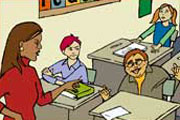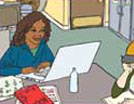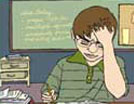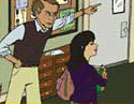What should Ms. Rollison know about behavior in order to help Joseph?
Page 1: Understanding Behavior
 As Ms. Rollison has discovered, one student’s disruptive behavior can upset an entire classroom environment. Such behavior can interfere with a teacher’s ability to meet the educational needs of all his or her students. Teachers like Ms. Rollison may use a variety of behavioral interventions to address disruptive behaviors. When these interventions fail to work with every student, however, teachers often do not understand why.
As Ms. Rollison has discovered, one student’s disruptive behavior can upset an entire classroom environment. Such behavior can interfere with a teacher’s ability to meet the educational needs of all his or her students. Teachers like Ms. Rollison may use a variety of behavioral interventions to address disruptive behaviors. When these interventions fail to work with every student, however, teachers often do not understand why.
It is for this reason that it is important for teachers to understand that much of student behavior—appropriate or otherwise—is learned. As such, behavior can be influenced by the consequences that follow it. Consequences can either increase or decrease the probability that a behavior will occur in the future. Therefore, teachers can modify student behavior once they understand the reasons behind it. Consider the experiences of three students who all receive a class assignment:
 Dajè finishes her class work quickly and correctly. She is allowed to spend the rest of the class period playing her favorite computer math game.
Dajè finishes her class work quickly and correctly. She is allowed to spend the rest of the class period playing her favorite computer math game.
 Dawson finishes his class work quickly and correctly. His teacher gives him more worksheets to complete.
Dawson finishes his class work quickly and correctly. His teacher gives him more worksheets to complete.
 Cheralynn works for a few minutes then makes a rude comment. In response, her teacher sends her into the hallway.
Cheralynn works for a few minutes then makes a rude comment. In response, her teacher sends her into the hallway.
As you think about the situations described above, it may be helpful to understand some terms that refer to components of the behavioral learning process:
- Antecedent: Any situation, action, or event that immediately precedes a behavior
- Behavior: An observable or measurable act
- Consequence: A response, action, or event that immediately follows a behavior
According to behaviorists, a chain of events creates the learning process for behaviors. This behavioral chain can be referred to as the ABC model. Let’s take another look at the situations for Dajè, Dawson, and Cheralynn, this time using the ABC model.
| Antecedent | Behavior | Consequence |
Dajè’s teacher passes out class work. |
Dajè completes the work quickly and accurately. | Dajè gets to play a math game on the computer. |
Dawson’s teacher passes out class work. |
Dawson completes the work quickly and accurately. | Dawson receives more worksheets to complete. |
Cheralynn’s teacher passes out class work. |
Cheralynn makes a rude comment. | Cheralynn has to stand in the hallway—but she also gets out of doing the assignment. |
In these examples, Dajè, Dawson, and Cheralynn were all assigned class work, but the consequences that occurred were different. How will each consequence influence the students’ future behaviors?
 Dajè learned that when she works quickly and efficiently, she gets to play on the computer. Therefore, she is more likely to work in this manner in the future.
Dajè learned that when she works quickly and efficiently, she gets to play on the computer. Therefore, she is more likely to work in this manner in the future.
 Dawson learned that when he works quickly and efficiently, he gets more work. Therefore, he is more likely to work slowly in the future to avoid that consequence.
Dawson learned that when he works quickly and efficiently, he gets more work. Therefore, he is more likely to work slowly in the future to avoid that consequence.
 Cheralynn learned that when she makes a rude comment, she gets sent to the hallway. If Cheralynn considers being sent to the hallway to be an unpleasant consequence, she is less likely to make rude comments in the future. On the other hand, if Cheralynn is trying to avoid her class work by being sent to the hallway, she is more likely to make rude comments in the future.
Cheralynn learned that when she makes a rude comment, she gets sent to the hallway. If Cheralynn considers being sent to the hallway to be an unpleasant consequence, she is less likely to make rude comments in the future. On the other hand, if Cheralynn is trying to avoid her class work by being sent to the hallway, she is more likely to make rude comments in the future.
Activity
 Nathan is a great kid—smart, athletic, and polite. However, Nathan did not turn in his homework today. As a result, he has to stay in during recess and complete his homework. Identify the ABC pattern in this situation.
Nathan is a great kid—smart, athletic, and polite. However, Nathan did not turn in his homework today. As a result, he has to stay in during recess and complete his homework. Identify the ABC pattern in this situation.
 Nathan has to stay in at recess.
Nathan has to stay in at recess. Homework is assigned.
Homework is assigned. Nathan doesn't do the homework.
Nathan doesn't do the homework. Nathan has to stay in at recess.
Nathan has to stay in at recess. Homework is assigned.
Homework is assigned. Nathan doesn't do the homework.
Nathan doesn't do the homework. Nathan has to stay in at recess.
Nathan has to stay in at recess. Homework is assigned.
Homework is assigned. Nathan doesn't do the homework.
Nathan doesn't do the homework.
 Based on the information you have so far, do you think that Nathan will remember to do his homework tonight?
It depends. If Nathan enjoys recess, missing it would be an unpleasant consequence, and he is likely to remember his homework tomorrow. On the other hand, if Nathan enjoys staying in at recess—perhaps it's been very cold outside lately, or older students pick on him on the playground, or he has a crush on his teacher—staying in would be a pleasant consequence, and he is less likely to turn in his homework.
As with any situation, the teacher should consider additional factors. For example:
Based on the information you have so far, do you think that Nathan will remember to do his homework tonight?
It depends. If Nathan enjoys recess, missing it would be an unpleasant consequence, and he is likely to remember his homework tomorrow. On the other hand, if Nathan enjoys staying in at recess—perhaps it's been very cold outside lately, or older students pick on him on the playground, or he has a crush on his teacher—staying in would be a pleasant consequence, and he is less likely to turn in his homework.
As with any situation, the teacher should consider additional factors. For example:
|